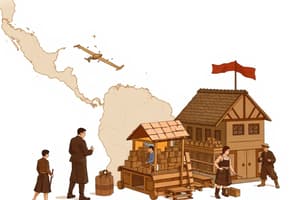Podcast
Questions and Answers
What was the primary impact of the Louisiana Purchase on the United States?
What was the primary impact of the Louisiana Purchase on the United States?
- Increased foreign debts significantly.
- Doubled the size of the US, enabling westward expansion. (correct)
- Limited territory to the east of the Mississippi River.
- Ended all conflicts with Native American tribes.
Which of the following statements accurately reflects Washington's beliefs for national success?
Which of the following statements accurately reflects Washington's beliefs for national success?
- Unity and neutrality in foreign affairs. (correct)
- Active involvement in European conflicts.
- Support for strong political factions.
- Emphasis on the power of the federal government.
What was a significant outcome of the Missouri Compromise?
What was a significant outcome of the Missouri Compromise?
- Slavery was permitted above the latitude of 36°30′.
- Missouri became a slave state while Maine became a free state. (correct)
- All states were designated as free states.
- It abolished slavery in all territories.
What was the purpose of the Embargo Act of 1807?
What was the purpose of the Embargo Act of 1807?
What was a central theme of the Virginia and Kentucky Resolutions?
What was a central theme of the Virginia and Kentucky Resolutions?
What was the primary economic focus of the Southern colonies?
What was the primary economic focus of the Southern colonies?
What was the purpose of the Proclamation of 1763?
What was the purpose of the Proclamation of 1763?
Which of the following accurately describes mercantilism?
Which of the following accurately describes mercantilism?
What was a consequence of colonial boycotts of British goods?
What was a consequence of colonial boycotts of British goods?
What was the significance of the Albany Plan of Union?
What was the significance of the Albany Plan of Union?
In which Supreme Court case was the power to declare laws unconstitutional established?
In which Supreme Court case was the power to declare laws unconstitutional established?
What characterizes strict constructionists in interpretation of the Constitution?
What characterizes strict constructionists in interpretation of the Constitution?
What were the causes of the War of 1812?
What were the causes of the War of 1812?
Flashcards
Mercantilism
Mercantilism
Economic policy where colonies exist to benefit the mother country, enriching it.
Navigation Acts
Navigation Acts
Laws restricting colonial trade to British ships and ports, limiting colonial independence.
Proclamation of 1763
Proclamation of 1763
This British law prohibited westward settlement beyond the Appalachian Mountains to avoid conflict with Native Americans. It angered colonists who wanted to expand west.
Sugar Act
Sugar Act
Signup and view all the flashcards
Albany Plan of Union
Albany Plan of Union
Signup and view all the flashcards
Marbury v. Madison
Marbury v. Madison
Signup and view all the flashcards
McCulloch v. Maryland
McCulloch v. Maryland
Signup and view all the flashcards
War of 1812
War of 1812
Signup and view all the flashcards
Washington's Beliefs for National Success
Washington's Beliefs for National Success
Signup and view all the flashcards
Worcester v. Georgia
Worcester v. Georgia
Signup and view all the flashcards
Manifest Destiny
Manifest Destiny
Signup and view all the flashcards
Embargo Act of 1807
Embargo Act of 1807
Signup and view all the flashcards
Virginia and Kentucky Resolutions
Virginia and Kentucky Resolutions
Signup and view all the flashcards
Study Notes
Colonial Economies
- New England colonies focused on shipbuilding, fishing, and trade due to their rocky soil and coastal access.
- Southern colonies relied on agriculture because of fertile land.
- Middle Colonies boasted a diverse population, fertile land suitable for farming, and thriving trade and port cities.
Proclamation of 1763
- British law prohibiting westward settlement beyond the Appalachian Mountains.
- Aimed to prevent conflicts with Native Americans.
- Colonists opposed it, as it restricted westward expansion.
Mercantilism and Navigation Acts
- Mercantilism: An economic system where colonies benefited the mother country.
- Navigation Acts: Restricted colonial trade to British ships and ports, limiting colonial independence.
Native American Life Before Columbus
- Diverse cultures existed.
- Plains tribes hunted buffalo.
- Eastern woodland tribes farmed.
- Coastal tribes fished.
- Extensive trade networks connected regions.
- A sustainable environment existed.
European Treatment of Native Americans
- France maintained better relationships with Native Americans, prioritizing fur trade and alliances over conquest.
- French had Native American allies during the French and Indian War.
Albany Plan of Union
- Aimed to unite colonies for defense against French threats.
- Marked the first attempt at colonial unity.
- The "Join or Die" cartoon illustrated the need for unity.
Repeal of Stamp Act and Townshend Duties
- Colonial boycotts of British goods damaged the British economy, leading to their repeal.
Sugar Act
- Imposed a tax on sugar and molasses to raise revenue.
- Protests arose due to the "taxation without representation" principle.
Key Constitutional Amendments
- 1st Amendment: Protects freedom of speech, religion, and press.
- 2nd Amendment: Guarantees the right to bear arms.
- 4th Amendment: Protects against unlawful searches and seizures.
- 10th Amendment: Reserves powers not delegated to the federal government to the states.
Alien and Sedition Acts
- Intended to suppress opposition to the Federalist government.
- Generated anger among Democratic-Republicans, who viewed the acts as unconstitutional.
Marbury v. Madison and McCulloch v. Maryland
- Marbury v. Madison: Established the Supreme Court's power of judicial review.
- McCulloch v. Maryland: Strengthened federal power by establishing that states cannot tax national institutions.
Strict vs. Loose Constructionists
- Strict constructionists: Literal interpreters of the Constitution.
- Loose constructionists: Flexible interpreters of the Constitution.
- Led to debates regarding federal power and policies.
War of 1812
- Causes included the impressment of U.S. sailors and the pro-war stance of "war hawks".
- Ended with the Treaty of Ghent, increasing U.S. nationalism.
Louisiana Purchase
- Doubled the size of the U.S. and spurred westward expansion.
- Purchased from France by President Jefferson.
Washington's Beliefs for National Success
- Unity.
- Neutrality in foreign affairs.
- Avoiding political factions.
Hamilton's Financial Plan
- Stabilized the U.S. economy by assuming state debts, creating a national bank, and promoting manufacturing.
- Long-term goal: Strengthened federal power and built national credit.
Pinckney's Treaty
- Granted U.S. access to the Mississippi River and New Orleans for trade.
Missouri Compromise
- Balanced the number of free and slave states by admitting Missouri as a slave state and Maine as a free state.
- Banned slavery north of a certain latitude.
Worcester v. Georgia
- Recognized Native American sovereignty.
- Ignored by President Andrew Jackson, leading to the Trail of Tears.
Virginia and Kentucky Resolutions
- Opposed the Alien and Sedition Acts.
- Advocated for states' rights to nullify federal laws.
Southern Slavery
- Integral to the Southern economy.
- Involved harsh treatment.
- Southerners argued slavery was necessary.
Embargo Act of 1807
- Closed U.S. ports to prevent British and French interference.
- Hurt the U.S. economy.
Manifest Destiny
- Belief in U.S. westward expansion.
- Led to Native American displacement.
- Increased sectional tensions.
Compromise of 1850
- Resolved issues arising from the Mexican-American War.
- California admitted as a free state.
- Popular sovereignty in new territories.
Fort Sumter
- Marked the beginning of the Civil War with the first attack.
Articles of Confederation
- Weak federal government due to a lack of taxing power.
Federalists vs. Anti-Federalists Leaders
- Federalists: Alexander Hamilton, John Adams.
- Anti-Federalists: Thomas Jefferson, Patrick Henry.
Washington's Farewell Address
- Warned against political parties and foreign alliances.
- Supported neutrality in foreign affairs.
Studying That Suits You
Use AI to generate personalized quizzes and flashcards to suit your learning preferences.
Description
Explore the diverse economic systems of early American colonies, including New England, Southern, and Middle Colonies. Understand the implications of the Proclamation of 1763 and the principles of mercantilism. Additionally, gain insights into Native American cultures and their trade networks prior to European contact.




